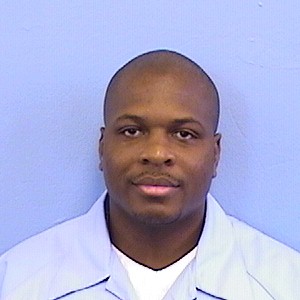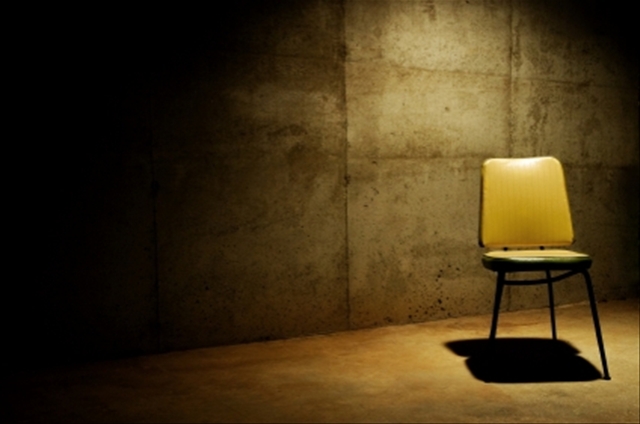
Carl Williams’ inmate photo from Stateville Correctional Center. Photo courtesy of the Illinois Department of Corrections.
Carl Williams was 17 years old when Cook County police arrested him in January of 1994. Williams was charged with two counts of murder and one count of sexual assault. He confessed to the crime after a police interrogation and along with four co-defendants, Williams was sentenced to life imprisonment without parole in 1996.
Now, 18 years later, Williams, who claims he is innocent, has been granted an evidentiary hearing and a re-sentencing by the 1st District Appellate Court of Illinois. “The case of the wrong Carl” is a prime example of change in the way Illinois judges view confessions, said Steven Drizin, director of the Center on Wrongful Convictions – and co-founder of the Center on Wrong Convictions of Youth - at the Northwestern University School of Law.
The Cook County justice system interrogates its juveniles as they do its adults. And the center is quite certain that of the 100-plus juveniles currently serving life without parole sentences in the state, many of their convictions were based on false confessions.
Police found two of Williams’ co-defendants, Anthony Brown and Zarice Johnson, in a car with ‘Larry McGee,’ whose real name was later revealed as Clinton Taylor, a day after the murder on Jan. 14, 1994. Police who had already arrested the other two co-defendants only knew that the fifth perpetrator’s name was ‘Carl.’ Police demanded McGee tell them where ‘Carl’ was and threatened to implicate him in the crime, said Michael Sklar, Williams’ attorney. So McGee told them where to find the only Carl he knew, Carl Williams, Clinton Taylor, McGee’s real name, wrote in an affidavit obtained years later by Sklar.
Williams was arrested at half past 8 a.m. on that same day. He was brought to a small, windowless interrogation room in the South side of Chicago and handcuffed to the wall, Sklar said, where he was interrogated until 5 p.m. without food or drink.
“[Williams] said he was yelled at and accused of being involved in the crimes, and then towards the end of the interrogation, he claims he was physically abused, hit and knocked to the ground by the interrogating officers,” Sklar said. Several hours later, at 11:15 p.m. Williams signed a confession – a hand written one by the assistant state’s attorney, which, according to Williams, went on for 10 pages and was ultimately a false admission.
“I think at least in Illinois, judges can no longer pretend that false confessions don’t exist,” Drizin said. “There have just been too many cases of proven false confessions and it’s beginning to challenge the long-held opinions of some who are on the bench. And the Williams case is a prime example. One of the justices [Patrick Quinn], during oral argument, commented that his views [on] false confessions are evolving.”
The drama – and trauma – of the Carl Williams case is hardly an isolated occurrence – one in fact that seems so common in Illinois and Cook County that ’60 Minutes’ recently ran a segment on cases, police and prosecutors here, dubbing Chicago as the ‘capital’ of false confessions. It’s a charge that Cook County State’s Attorney Anita Alvarez responded to quickly, and angrily, in letters to CBS News and various news organizations.
But there’s no denying this: The past few years have highlighted the role of false confessions in juvenile convictions. In the Dixmoor 5 case, in which five juveniles were convicted with the 1991 murder and rape of a 14-year-old girl in the Chicago suburb, all five of the suspects had their convictions vacated and the group was cleared of the charges after DNA evidence exonerated them and their confessions were deemed false.
In the Englewood case, which happened in one of Chicago’s most bloody and notorious neighborhoods, four juveniles – ages 15, 16, 17 and 18 – were convicted in 1995 with the murder and rape of 30-year-old Nina Glover, who was slain four months earlier. All four had their convictions overturned on Nov. 16, 2011– also because of DNA evidence that showed the semen on Glover’s body belonged to a man with a long history of violence against sex workers and what were deemed false confessions.
“There was a time, decades, where I would completely agree with you…based on personal experience that people don’t confess to heinous murders,” said Justice Patrick Quinn during oral arguments to the prosecutor handling the case. Noting many changes have come with the advance of DNA testing and other science, he continued: “Why people confess to murdering and raping people, I have no idea, but they do. And it’s just a fact of jurisprudence that people do falsely say that they did terrible acts when they’re lying about it.”
And Drizin charged the problems that forced Williams and other juveniles to make false confessions. – problems he and others believe are systematic – still exist, and quite widely.
The reasons, he and other experts say, are many. But chief among them, perhaps, is that Chicago police are not trained to interrogate juveniles, who an increasing number of studies and even the U.S. Supreme Court have said are developmentally different from adults, and that electronic recordings, which can help judges, lawyers and police officers later determine if the interrogators had given enough detail for a false confession to be made, is only required by Illinois law of homicide interrogations – not all juvenile cases.
“When you have a highly confrontational interrogation in which police officers accuse suspects of lying, themselves lie, about the evidence against the suspect, and suggest to suspects that they will be treated more leniently if they can confess then if they don’t, you’re going to get a large number of false confessions from kids,” Drizin said.
The prefrontal cortex of the brain regulates judgment, problem-solving and stops impulsive behavior when an individual is faced with stress or fear. The prefrontal cortex of children and youth are less developed than in adults, according to, among others, the International Association of the Chiefs of Police (IACP), a nonprofit for police executives founded in Chicago.
In a joint collaboration between the IACP and the Center on Wrongful Conviction of Youth, several standards were established in a brief for police interrogation of juveniles. Among other suggestions, police need to explain the juveniles’ Miranda Rights in simple terms, as the Miranda Rights requires a tenth-grade reading comprehension, and, even then, the juvenile may not understand their rights fully.
The interrogation can’t last more than four hours, especially not at night as they often had. After the first hour of interrogation, with each passing hour comes an increased chance of unreliable testimony and false confessions, according to experts. Police can’t use deception, threats or leniency as interrogation tactics as they lead juveniles to believe they have no choice but to confess to a crime they didn’t commit or juveniles begin to have doubts about their own innocence.
In a 2005 study of 340 individuals wrongfully convicted from 1989 to 2003 by Samuel R. Gross, a professor at the University of Michigan Law School, 42 percent of juveniles had made false confessions while only 13 percent of adults in the study had done so.
Police across Cook County, which includes Chicago and is among the largest court systems in the country and world, need to be trained in interrogating juveniles and adopt measures to ensure false confessions aren’t made, said Joshua Tepfer, project director at the Center on Wrongful Convictions of Youth.
Police across Cook County, which includes Chicago and is among the largest court systems in the country and world, need to adopt measures to ensure false confessions aren’t made, said Joshua Tepfer, project director at the Center on Wrongful Convictions of Youth. Training police in interrogating juveniles is “the best thing that can be done,” Tepfer said in a recent opinion piece in the Chicago Sun Times. Such measures include using simpler language, avoiding deception, and using electronic recordings of interrogations. In 2005, lawmakers in Illinois passed a law requiring interrogations in homicide cases are electronically recorded—video or audio.
The law, should be extended to all juvenile cases, and not just homicides, Drizin said. Recordings serve to prevent police misconduct and also to help prosecutors, police, jurors, judges determine afterwards whether the defendant’s confession was a false one. Even a well-meaning police officer or prosecutor can give away facts and suggest answers in an intense interrogation, which the juvenile suspect will, all too frequently, repeat back to investigators during the confession.
But, “recording is not a panacea,” Drizin added in an email. “False confessions will continue to exist as long as police officers continue to interrogate suspects as if they were adults.”
Instead, juvenile suspects should be required to have counseling during interrogations, Drizin added. Juveniles often do not understand the consequences of their answers or their rights when they’re being interrogated. The presence of a parent, guardian, lawyer or even a youth officer – a police officer asked to switch roles and become an advocate for the juvenile during the interrogation – would be a friendly presence to the juvenile and decrease the chance of a false confessions, according to the IACP and CWCY brief.
The U.S. Supreme Court ruled in 1962 in the case of Gallegos v. Colorado, which involved the five-hour-long relay interrogation of a 15-year-old boy in the middle of the night on the murder of an elderly man that “a lawyer or an adult relative or friend could have given the petition the protection which his own immaturity could not.”
Drizin says he hopes police and prosecutors across Cook County, will adopt the measures outlined police needs to adopt when interrogating youth in the brief done by IACP and CWCY.
Such protections and measures could have helped Williams 18 years ago when he was subject to over seven hours of interrogation without food or water, and ended in what Williams maintains was a false confession.
Williams, who is now 36, appealed his ruling only to have his conviction affirmed by the state appellate court. He then petitioned twice at trial courts to have his convictions vacated, citing a warrantless arrest and withholding of evidence favorable to Williams by police. In his second petition, Williams was able to obtain affidavits from two of his co-defendants stating that when the police showed the co-defendants a Polaroid photo of Williams, the co-defendants had told the police Williams wasn’t the fifth perpetrator.
With each petition the court sided with the state. The third petition filed by Sklar and Williams resulted in the evidentiary hearing and resentencing. The ruling was a hard win, but brief victory after almost two decades of litigation battles. Williams is due a re-sentencing hearing regardless of whether the evidentiary hearing is successful or not because Williams was a juvenile when he was sentenced to life without parole. The appellate judge ruled that the U.S. Supreme Court’s ruling in Miller v. Alabama, in which the court this summer ruled that juveniles cannot be sentenced to life imprisonment without parole – no matter the charge facing them, including murder, should be applied retroactively to Williams’ case.
Still, having his conviction vacated is not the same as being completely clear. Williams, in fact, is far from having his conviction overturned. He and Sklar are waiting, not for the evidentiary hearing, but for the state to decide if it will file a Petition for Leave to Appeal with the Illinois Supreme Court. Then, if the state’s high court decides to take the appeal, the ruling in favor of Williams could be overturned. If the appeal is not taken, then a hearing date will be scheduled. Williams could be months to a year away from his evidentiary hearing, Sklar said.
“[Williams] is incredibly calm and he’s hopeful,” Sklar said. “But he’s realistic.”
This story first appeared in The Chicago Bureau.
